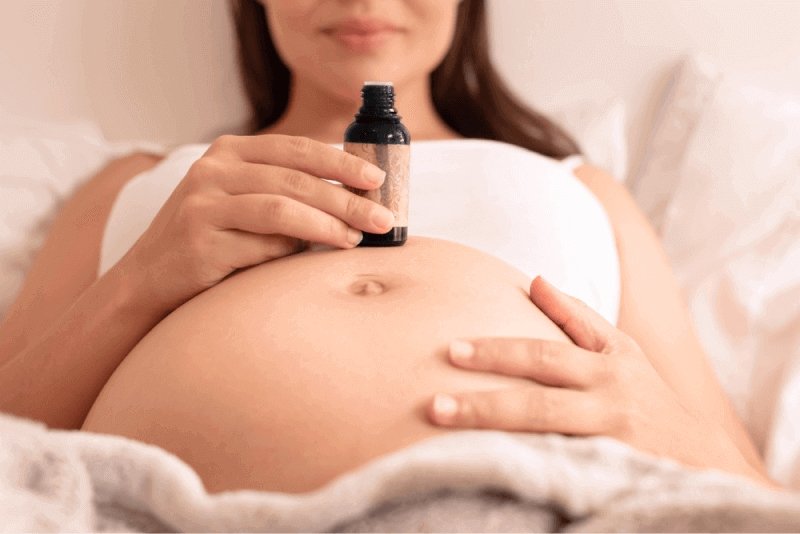Are essential oils safe for pregnancy? This topic has long been a subject of great debate. One school of thought says that it's best for pregnant women to avoid them, while another recommends using them. The answer lies somewhere in between the two articles. Essential oils are safe to use, but they should be limited and used with caution.
Pregnancy brings many changes, both inside and outside the woman's body. Hormone levels change drastically, heightening sensitivity to smell causing mood swings, energy level changes, food cravings, weight gain, fluid retention, hot flashes, trouble sleeping, nausea, and vomiting. All these symptoms are difficult enough without adding any other discomfort or ailment into the mix. That's where Oleia essential oils come in! Essential oils can help provide aromas that can help soothe nausea, ease cramping, help reduce weight gain, aid in improving energy level and mood swings, and even help prevent vomiting. While many essential oils are safe to use during pregnancy, it's best to consult with your doctor before using any.
How to use essential oils safely during pregnancy?
As with any product, essential oils can have side effects. They can interact with certain medications or cause an allergic reaction for some people. You should always consult your doctor to determine whether or not you should use any type of oil during pregnancy. Some health conditions prohibit using certain types of oils, while others recommend using specific ones for maximum benefits.
Here are some precautions you will want to keep in mind while using essential oils while pregnant.
- Always dilute your oil with a carrier or base oil before applying it to your skin. This helps prevent an overdose of the aromatic component which can lead to problems such as seizures and reproductive difficulties later on for you and/or your baby. You can also mix them into lotions or bathwater.
- Second, only purchase from reputable sources that provide accurate information about their products—check online reviews and forums for recommendations! If you aren't sure where they come from, how old they are, what the expiration date is, or how they were made, then think twice about buying them.
Do essential oils have side effects?
In general, you should consult a physician before using any type of oil while pregnant. Some types of oils—like those high in eucalyptol or menthol—have been known to cause problems such as seizures and breathing difficulties for certain individuals, so it's best to be safe than sorry. You can also ask your practitioner if there are any scents she recommends avoiding entirely during pregnancy; various aromas like chamomile, have been known to help produce positive effects such as lessening nausea and increasing milk production.

Essential oils to avoid during pregnancy
There are many essential oils that pregnant women should avoid. Because every woman's body is different, it's important to consult your physician before using any during pregnancy. Some scents may energize you while others relax you—and the best way to find out what works for you is by doing some research and consulting a trusted professional.
Essential oil brands can vary in quality so it's best to be sure about where they come from before using them on yourself or your baby! Avoid all artificial colors and flavors as well— stick with pure essential oils if possible.
Some of the essential oils that should be avoided during pregnancy include: aniseed, calamus root, campho, cassia, cinnamon leaf and bark, clove bud, fennel seed, hyssop, sage (except "Spanish" or "Wild"), thyme (except "Spanish" or "Wild"), wintergreen, wormwood, and yarrow.
In general, you should always speak with a doctor before using any type of oil during pregnancy.
What essential oils are safe for pregnancy?
There are several essential oils that can be used safely during pregnancy, however the best way to find out which ones work for you is by experimenting with different scents. Many women pick up on certain smells more easily than others, so it's a good idea to learn what each scent is known for before trying it. When in doubt, stick with something that you know will relax or energize you and not cause problems!
For instance:
- Lavender essential oil is known as the go-to essential oil for calm and relaxation both for pregnant and non-pregnant users.
- Frankincense essential oil has been found to help relax the muscles which is beneficial to expectant mothers during their pregnancy and even labor.
- Rose essential oil, particularly ones extracted from the Bulgarian rose, is often called “the queen of essential oils.” Much like lavender oil, rose oil can be used to help ease pregnancy-related anxiety, encourage calmness, and helps achieve a more restful night’s sleep.
There are many types of essential oils that are safe for pregnancy and the best way to stay on top of things is to keep a diary of each scent you try. This way you can note your experience with each oil and avoid using any scent you encounter problems with twice! Some scents may be appealing but can cause discomfort such as nausea. You may also be more sensitive to certain scents than others so it's important to know which you have a strong reaction to.
How to use essential oils during pregnancy?
These essential oils can all be used for skin care and bath preparations as well as in diffusers and room sprays. Some essential oils, such as Oleia essential oils, are specially formulated to make it easily absorbable by the skin and does not contain any harsh ingredients like methyl salicylate, camphor, and mineral oil. This means you can use directly on your skin especially if you prefer massage oils during labor! Some people add them to unscented lotions or oil blends while others like using them alone on their hands or feet before bed every night.
There are lots of other options for using them safely during pregnancy, so be sure to consult with your doctor if you need more detailed information before trying anything on your own. If you're allergic to any plants, then it's best not to use essential oils at all—and always speak with your doctor before trying anything new.

